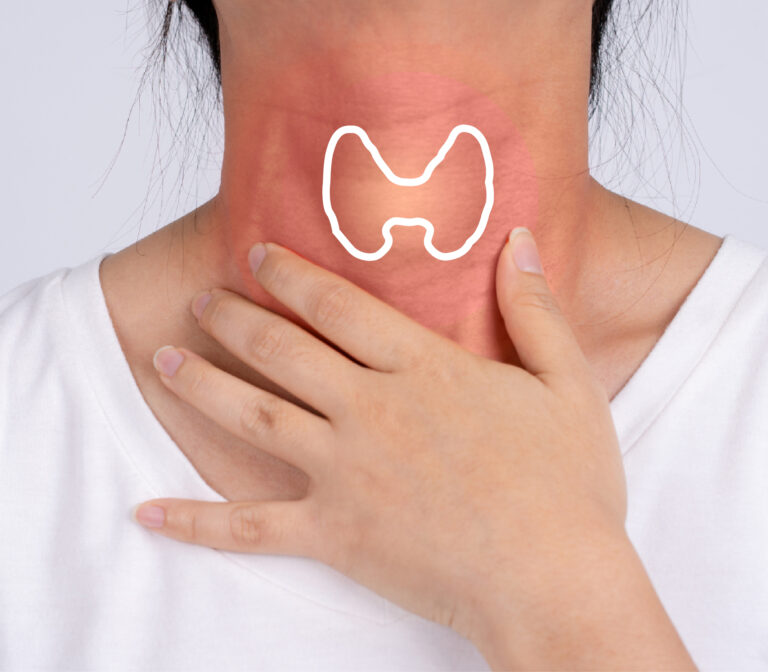Have you been experiencing pain in front of neck? Noticed a small lump near your throat that seems to be growing by the day? With the rise of thyroid cancer globally, you may start to panic and wonder ‘Do I have thyroid cancer?’
Fear not: Experiencing pain in front of neck does not mean you have thyroid cancer, as it comes with other symptoms. Even then, these symptoms could be indicative of non-cancerous conditions.
It is important to seek medical attention to confirm a diagnosis. The prognosis is positive, especially if the cancer is detected early. Read on to find out the symptoms of thyroid cancer and what you should do if you suspect you have thyroid cancer.
Table of Contents
ToggleThe Thyroid and Its Function
The thyroid is a small butterfly-shaped gland located in the neck region. While it is located in front of the windpipe (trachea), a healthy thyroid does not protrude from your throat, and you should not be able to see or feel it.
The thyroid gland is part of the endocrine system that releases hormones to regulate various functions in the body such as metabolism, heart function, and bone development. The main hormones that thyroid produces are:
- Thyroxine (T4): It is a hormone that includes 4 iodine molecules. Once it is released into the bloodstream, the hormones lose one iodine to form triiodothyronine (T3), which regulates metabolism.
- Reverse triiodothyronine (RT3): It reverses the effects to T3 to prevent excessive metabolism.
- Calcitonin: This hormone increases calcium uptake in the bones to promote bone development.
The thyroid gland plays a vital role in regulating various organ systems such as the cardiovascular, nervous, and digestive systems. The health of thyroid gland is key to maintaining your overall well-being.
Types of Thyroid Conditions
It is important to note that thyroid gland itself does not have pain receptors, so one typically feels pain in the neck region rather than from the thyroid gland itself. Hence, it can be difficult to differentiate thyroid conditions from neck pain, which could be indicative of non-thyroid issues such as neck strain or injury.
Nonetheless, pain in the neck region could develop from the growth of a mass or tumour in the thyroid that compresses against other structures like the windpipe or vocal cords. This could be an indication of various types of thyroid diseases:
Hyperthyroidism
The thyroid produces excessive amounts of hormones, meaning almost all your organ systems are working harder. This leads to excessive metabolism, causing weight loss and increased appetite. Your cardiovascular and digestive systems are also hyperactive, causing heart palpitations and more frequent bowel movements. A goiter, which is an enlargement in your neck, may develop which can be painful upon touch.
Hypothyroidism
The thyroid does not produce enough thyroid hormones, leading to lethargy, reduced heart rate, and weight gain. A goiter could also develop, causing pain.
Thyroiditis
It is an inflammation of the thyroid gland. The thyroid may feel swollen and tender to the touch. Pain may intensify when you move your neck or swallow. Sometimes, the pain can spread from the neck to the jaw and ears. The most common types of thyroiditis are:
- Hashimoto’s thyroiditis: Autoimmune condition when your body produces anti-thyroid antibodies to attack the thyroid, which could lead to hypothyroidism.
- Subacute thyroiditis: A symptom of viral infection.
Thyroid cancer
Thyroid cancer occurs when cancer cells form in the tissues of thyroid gland. There are various types of thyroid cancer, which is determined by how the cancer cells look under a microscope:
- Papillary thyroid cancer: This is the most common type of thyroid cancer. The tumour is localised in the thyroid, though in some cases it grows slowly and spread to the lymph nodes in the neck region. It has a positive prognosis for most patients.
- Follicular thyroid cancer: Cancer cells spread to the lymph nodes and other surrounding organs such as the lungs and bones. It is more common in older individuals, and the risk increases with age.
- Medullary thyroid cancer: Accounting for approximately 2% of all thyroid cancers, it is a tumour that grows in the C cells of the thyroid which produces calcitonin (regulates calcium levels in the blood). 25% of the cases are inherited via a genetic mutation in the RET gene.
- Anaplastic thyroid cancer: It is the most advanced and aggressive form of thyroid cancer. Some individuals may experience pain or discomfort in the neck or throat area.
Pain in the neck can be a sign of thyroid cancer, along with other symptoms like swelling and lump formation in the neck. As these symptoms are also common with other types of thyroid diseases, experiencing pain in the neck is not a definitive symptom of thyroid cancer. More tests need to be conducted to confirm a diagnosis.
The Link Between Pain In front Of Neck and Cancer
Experiencing pain in the neck is not a common symptom of thyroid cancer, especially in its early stages. However, as the cancer progresses and the tumour starts to invade the surrounding tissues, individuals may experience discomfort in the neck region.
The type of thyroid cancer can also affect the symptoms experienced. Papillary and follicular thyroid cancer typically has fewer symptoms and a good prognosis. On the other hand, patients with rarer and more aggressive forms of cancer such as anaplastic thyroid cancer are more likely to experience pain in the neck.
Thyroid cancer is more commonly associated with other symptoms such as a lump in the neck, changes in voice, difficulty swallowing, or swelling in the neck region. Even then, a lump in the neck can be indicative of thyroid nodules, which are non-cancerous lumps in the thyroid caused by an abnormal growth of thyroid cells. Diagnostic tests are needed to determine if the lump is cancerous.
If you have a combination of these symptoms, consult a doctor as soon as possible for early detection, which increases the chances of a successful treatment.
Recognizing Warning Signs
Some thyroid cancer may be asymptomatic in its early stages i.e. no symptoms. Symptoms may appear as the tumour grows and compresses the windpipe or vocal cords. Check with your doctor if you have the following signs:
- A visible lump in the neck
- Difficulty swallowing
- Difficulty breathing
- Hoarseness or voice changes
- Coughing / coughing up blood
Thyroid cancer can occur to anyone at any age. However, certain factors can increase the risk of developing thyroid cancer:
- Age: Between 25 to 64 years old
- Gender: Thyroid cancer is more common for women than men
- Exposure to radiation
- Family history of thyroid cancer
- Iodine deficiency or excess
- Acromegaly: A rare condition where the body produces too much growth hormone
Having one or more of these factors does not guarantee that you will develop thyroid cancer. However, it is important to check for changes in your health e.g. weight fluctuation, fatigue, heart rate. Schedule thyroid screening regularly for early detection and treatment.
Screening and Diagnosis for Thyroid Cancer
Regular thyroid screening checks for early signs of tumour growth that may not present physical symptoms yet. By detecting the tumour in its infancy, it will be easier to contain and eradicate the tumour.
At Centre for Screening & Surgery, we provide thyroid screening that consists of:
Ultrasound scan
It is a non-invasive procedure that uses sound waves to obtain images of the structures of the body. For neck ultrasound, no dietary restriction is necessary prior to the ultrasound scan. You will be required to remove any jewellery and change into a gown.
During the examination, you will lie on your back with your neck extended slightly backwards. A gel will be applied to the skin over the neck region to allow the transmission of sound waves. A transducer, which is a device that emits sound waves, will move gently over the neck region to capture images of the thyroid gland.
The whole process will last from 15 to 30 minutes. The doctor will review the images to note any abnormalities or nodules in the neck that are indicative of thyroid cancer.
Ultrasound-guided biopsy
Also known as a thyroid fine-needle aspiration (FNA) biopsy, it is a procedure to obtain a small tissue sample of a suspicious thyroid nodule (larger than 1cm) detected in the ultrasound scan.
You may be given a local anaesthetic to numb the neck region. Like the ultrasound scan, a transducer is placed on the skin over the thyroid gland to guide the biopsy needle. A thin needle in inserted into the thyroid nodule, and a syringe is attached to the needle to extract a small tissue from the nodule. The tissue sample is sent for analysis to determine if the nodule is benign or cancerous.
Treatment Options
From generalised treatment to more targeted therapy, there is a range of treatments that suit the specific type of thyroid cancer. A multidisciplinary team will look at your condition to create a targeted treatment plan. It typically comprises a combination of treatments including:
Medication
Different types of medication are provided based on the treatment goal:
- Thyroid hormone replacement pills: Prescribed after thyroid removal surgery. As the body no longer produces thyroid hormones, the pills ensure a healthy level of thyroid hormones to regulate various functions of the body.
- Hormone therapy: Drugs that block hormone production that stimulate cancer growth. For example, drugs are used to prevent the production of thyroid-stimulating hormone, which is produced by the hypothalamus (part of the brain) to stimulate the thyroid to produce hormones that cause cancer growth.
- Targeted therapy: The drugs inhibit proteins from binding to receptors that send signals to the thyroid. This prevents excess production of thyroid hormones that contribute to cancer growth.
Radiation
Radiation uses high-energy X-rays to kill cancer cells. It uses a machine to send radiation directed towards the tumour (external radiation) or via the injection of radioactive substances directly into the cancer cells (internal radiation). It can be performed after surgery to kill off any remaining cancer cells.
Radioactive iodine therapy (RAI) is a form of internal radiation therapy specific to papillary or follicular thyroid cancer. Since the thyroid produces thyroxine hormone that is iodine-rich, RAI involves the injection of radioactive iodine, which will be taken up by the cancerous tissues. The radioactive iodine can destroy cancer cells without harming other healthy tissues.
Chemotherapy
Chemotherapy involves a combination of drugs to destroy cancer cells. It could be used to shrink large tumours until they become operable, or after surgery to reduce the risk of recurrence.
Surgery
Surgery is the main treatment for localized thyroid tumours. Depending on the type and severity of thyroid cancer, surgery is performed to remove the entire thyroid (thyroidectomy) or part of the thyroid where the tumour is found (thyroid lobectomy). If the cancer has spread to the lymph nodes, they could be removed during the surgery as well.
You may experience some temporary hoarseness after the surgery from possible irritation to the windpipe and vocal cords. The doctor will monitor them closely after the surgery to ensure they function properly.
If thyroidectomy is performed, you will need to take thyroid hormone replacement pills to ensure a healthy level of thyroid hormone for metabolic functions.
Blood Tests
Blood tests are usually part of post-treatment checkups to monitor thyroid hormone levels.
Living with Thyroid Cancer
Every experience is different, even among patients with the same type of thyroid cancer. Thankfully, prognosis for thyroid cancer is positive. According to the Singapore Cancer Registry Report 2019, thyroid cancer is among the most common cancers with the highest survival rates.
Nonetheless, being diagnosed with any type of cancer can be a scary experience. Beyond family and friends’ support, talking to other cancer patients or survivors via online support groups can provide comfort as well. Alternatively, you may talk to your doctor who can refer you to a therapist.
Conclusion
Experiencing pain in front of neck alone does not mean you have thyroid cancer, and it comes with other symptoms like difficulty swallowing and lump formation.
Early detection is key to receiving timely treatment. The best way to know your condition is to seek professional help.
If you experience any symptoms in the thyroid, book an appointment at the Centre for Screening & Surgery at 64757133 today!





